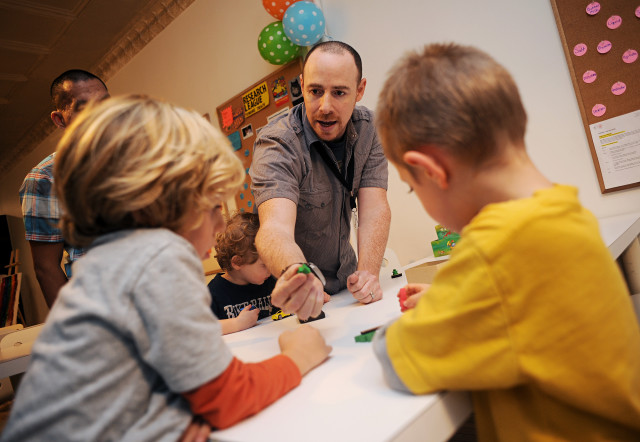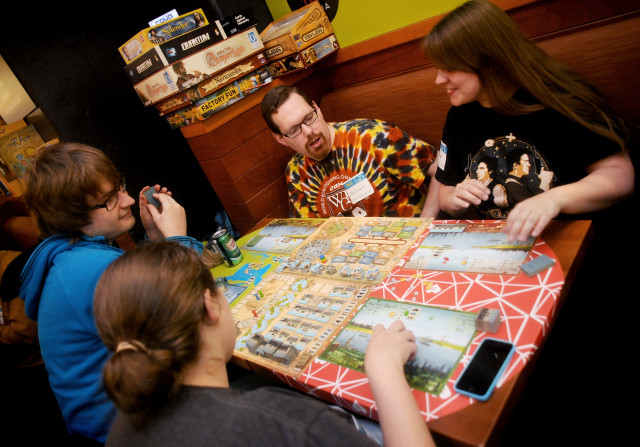I recently got to help out with a night of family board games to collect food for The Daily Bread Food Bank in Toronto. The evening was run by the organization Kid’s Table Board Gaming, the brainchild of Helaina Cappel. Around 20 families came out to learn new games and make a donation.
Cappel started her organization to develop her belief in children as board game designers. With programs for kids between the ages of 7-16 she is building the foundation of the next generation of gamers and designers.
“The goal of KTBG is to educate children (and their parents) in a way that is fun, social and educational.”
In the five months they’ve been in operation, Cappel has sought to use board games and KTBG as a method to partner with local charities.
“Every few months KTBG offers a FREE Family Games Night, geared toward getting parents and their children to spend some quality time gaming together. We don’t charge for this event. Instead we ask for a charitable donation to the charity we are working with at the time.”
The core programs of KTBG are meant to introduce kids to the world of board game design. They have have local game designers come in to work with the kids and they can even submit their work to game publishers. The games they teach are chosen with a specific purpose in mind.
“Each game we use at KTBG is hand picked because it allows a child to learn in an inconspicuous way. The games we use have very strong links to learning through reading, writing, mathematical probabilities and other mathematics, says Cappel. “The benefits of board gaming on the social and emotional aspects of children are astounding.”

Cappel played games like Monopoly and Sorry as child, but developed a love of modern games through The Settlers of Catan. “There was a summer I played at least two games a day, for two months straight. I didn’t miss a day!” From that point she was introduced to the world of modern board gaming. She has since become very familiar with the industry. Her husband Josh is and game artist and designer with games like Belfort, Bomb Squad Academy and The Walled City to his credit.
“I am impressed by the amazing support I have received within the community. I have made connections with so many amazing gamers (designers, publishers, and people who just like to game for the sport of it) who are helping make my company a success,” says Cappel.
More and more organizations and individuals are finding ways to use board games as a method to give back to the community. The Extra Life 25 hours board games campaign raised money around North America for Sick Kids Hospital. Gary Milakovic was responsible for organizing the event in Toronto. The Richtree restaurant in the Eaton Centre donated it’s space and stayed open all night. After organizing his own event Milakovic was inspired to find other ways to channel his charitable efforts.
“We co-hosted an event in May that was very well attended; we had 100 people signed up but we ended up getting way more than that throughout the day. We decided we wanted to turn our attention toward contributing to the community and when we found Extra Life and their mission online we were hooked. Raising money for the Children’s Miracle Network while gaming for 25 hours? Yes please. Not that we NEED an excuse to play games all night…but it doesn’t hurt, either.”
The importance Milakovic places on representing the board gaming community in a positive light is evident. Finding a partner to help direct his work has given him a path to follow.
“I think the great thing about what the Children’s Miracle Network has done with Extra Life is that it’s given gamers an avenue to channel their passion. Gamers have enormous hearts but until now there wasn’t really a charitable platform that appealed directly to them. Now, with Extra Life, we can give back to the community in a way that really speaks to us. I know there’s a lot of people with direct connections to Children’s Miracle Network hospitals, and SickKids in particular, so we feel this cause really resonates.”
This hobby is not just about the joy that we can all take out of it. The Dice Tower’s Jack Vasel Memorial Fund is designed to help out members of the gaming community when they need it the most. Recently John Spinello, the inventor of the childhood classic Operation, ran into some medical problems. Having sold his invention for a mere $500 in 1964, it was tough for him to pay for all of the ensuing bills when taken ill. Game designers and friends of Spinello, Peggy Brown and Tim Walsh were quick to jump to his aid. They crowd funded enough money to more than pay for Spinello’s own operation and also to help with the ensuing financial hardships that come with an extended medical problem.

Shared hobbies bring together all sorts of people. For those outside the group, it may seem like the participants are all cut from the same cloth, but for members, it’s easy to see the diversity of the people involved. Board games are no exception. There are rules lawyers, Euro-gamers, piece stackers, ragers, sufferers of analysis paralysis and any number of different gamer types you can name. Their backgrounds are pretty diverse and wide ranging. Doctors, servers, radio hosts, teachers, truck drivers all come together to form a board game community. Like any community there are outstanding members and some that we’re less proud of, but we all make up the whole.
Overall the board game community is pretty friendly and inclusive and welcoming, especially to new members. For those of us passionate about the hobby we’re always really excited when we get to share that love with someone new. There is strength in numbers and the more people playing games out there, the stronger the hobby and the industry is as a whole.
Helping out can be as simple as volunteering with an after school program or teaching games at your FLGS to help welcome new people to the hobby. You don’t have to go out and start a new charity to give back through board games, just remember that when you’re out there gaming in the world you’re representing a community that’s larger than just yourself. Be kind to other people. Be inclusive and tolerant. As gamers maybe we can’t change the entire world, but we can make it a little bit better. If we can succeed in this, then no matter the outcome of any one game, we’ll all come out winners.
Comments
No comments yet! Be the first!